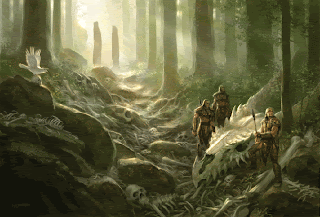"Midnight Tides
This book also starts a new trend in Erikson's writing. Internal monologues, philosophical discussions and mussing about meaning were always a part of his style, but never so often and in such length. A good portion of readers don't like this facet of his writing. I never had problems with it, and I like it in later books, but for some reason it never grew on me in this book. I put some thought in it and I think it is because of Edur perspective. Trull and Udinaas, two main sources of these lengthy lectures are Edur and Edur's slave. Edur are by nature broody, proper and long-living (grey suits them fine). And being a slave doesn't contribute to your general optimism. So the two of them give a bit melancholic tone to this book.
Now, to the goodies. Setting is great as usual, and introducing a totally new continent (but not pulling it out of the air; it was foreshadowed few times) only contribute to it. Adding not-strictly-necessary bits and pieces that fortify the image of the world was always Erikson's specialty. Next, the story is great. It can be somewhat confusing, especially during first reading, but you will get to appreciate it when you reread it. Characters are also great. The comedy pair of Tehol and Bugg, with their support characters is just brilliant (although not enough to topple Iskaral from the throne).
To summarize it, in style it is a typical Erikson. Similarly to HoC, I consider it a kind of transitional book. This doesn't mean it is not good, just that is not so strong like most of the book in the series. Also, melancholic parts of it can be off-putting to some, but in retrospective, it is a worthy addition to Malazan Book of the Fallen.

No comments:
Post a Comment